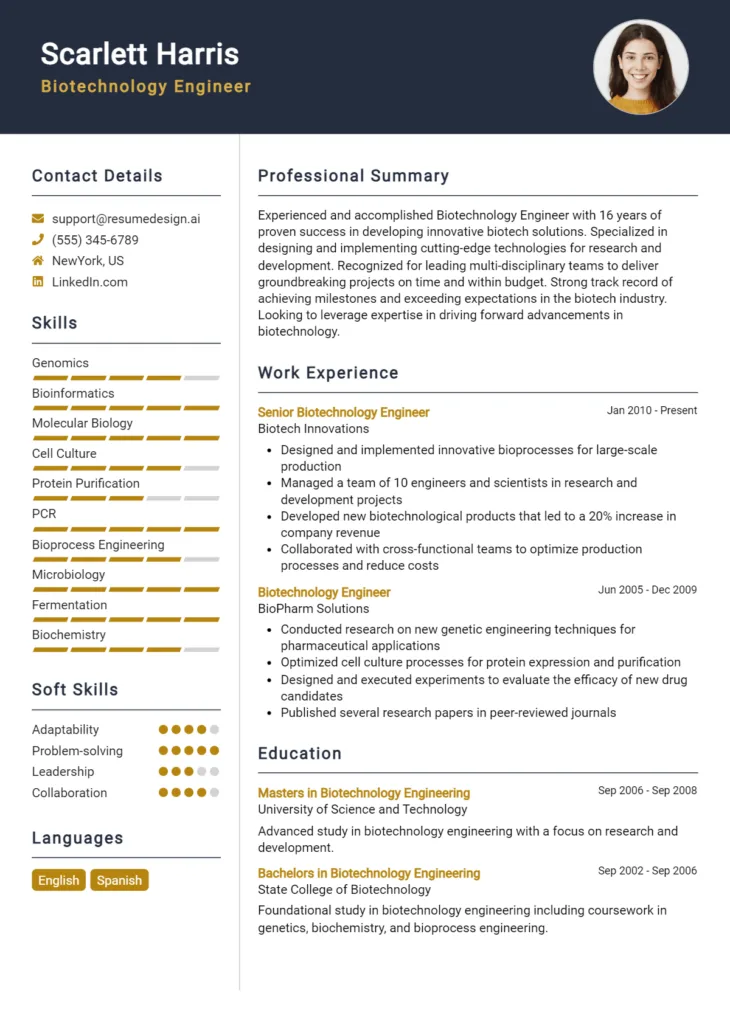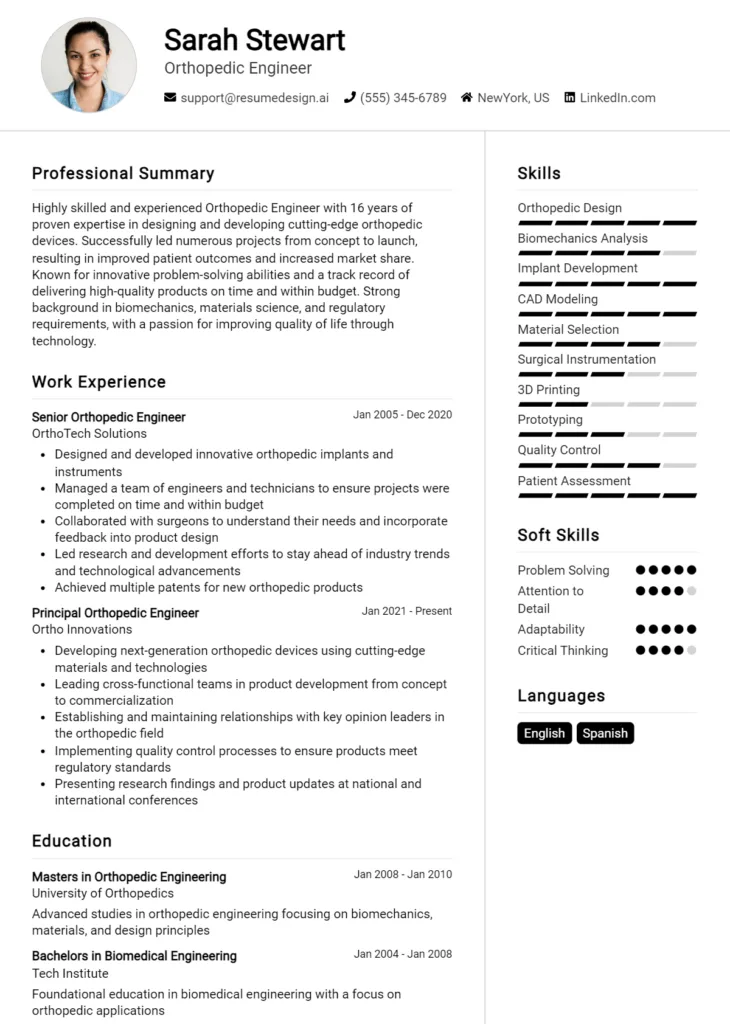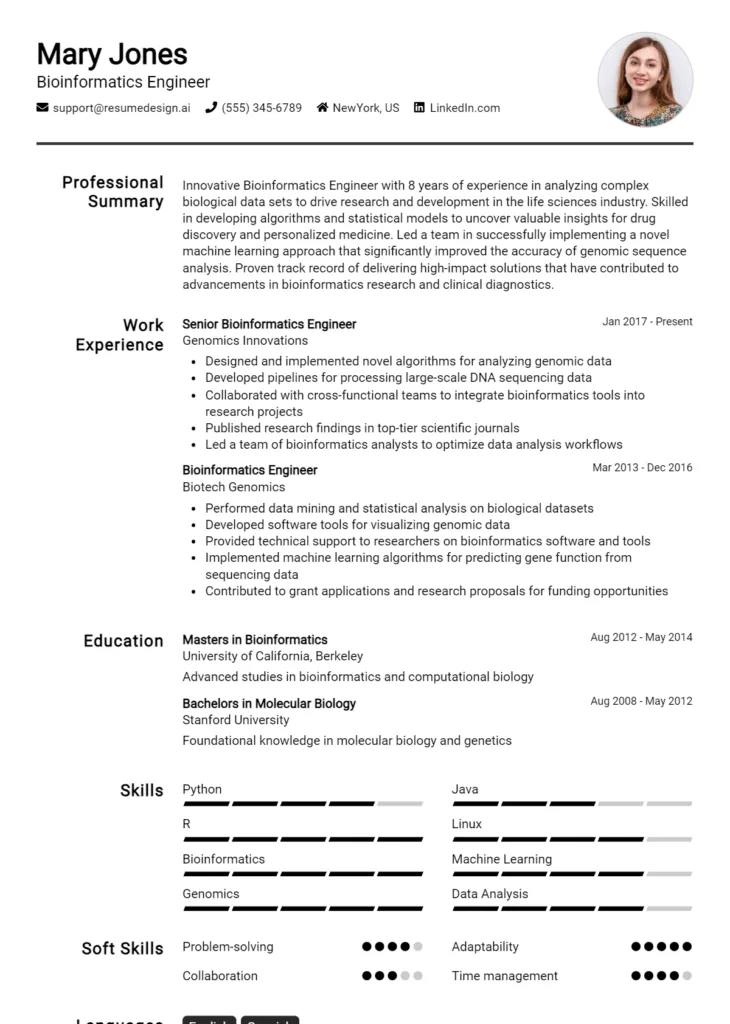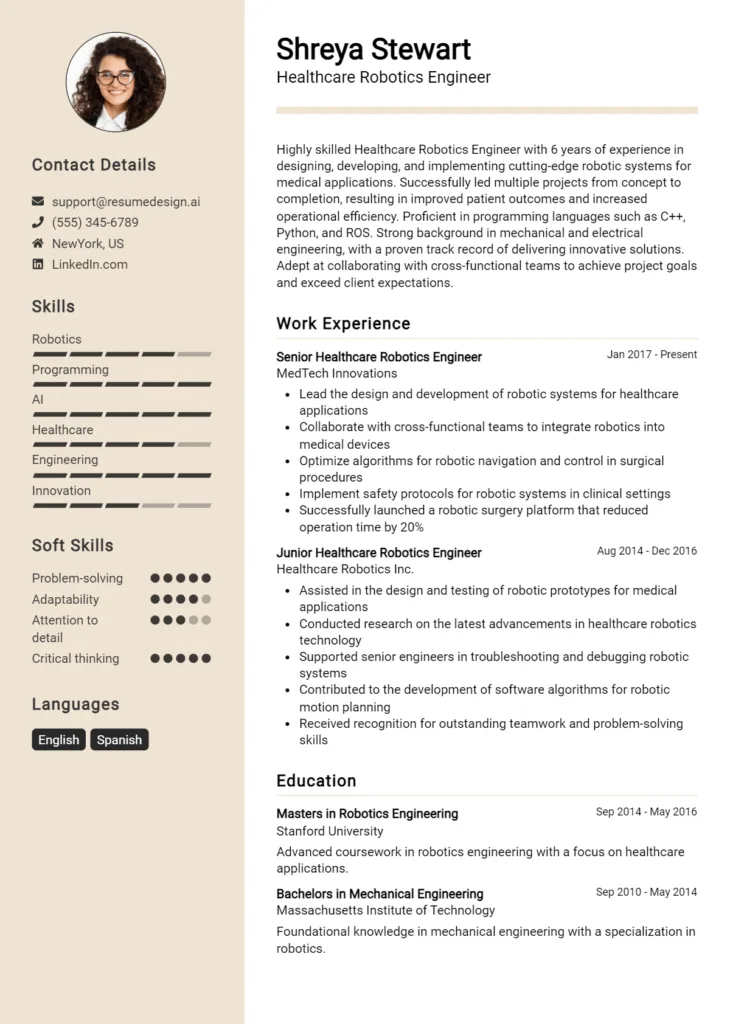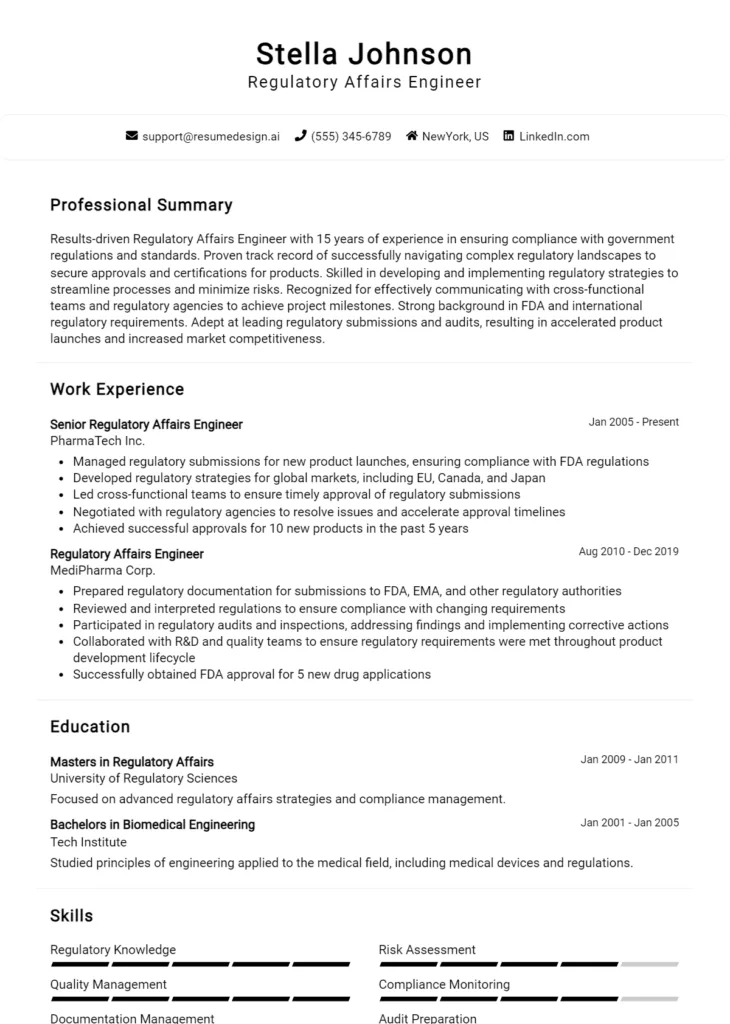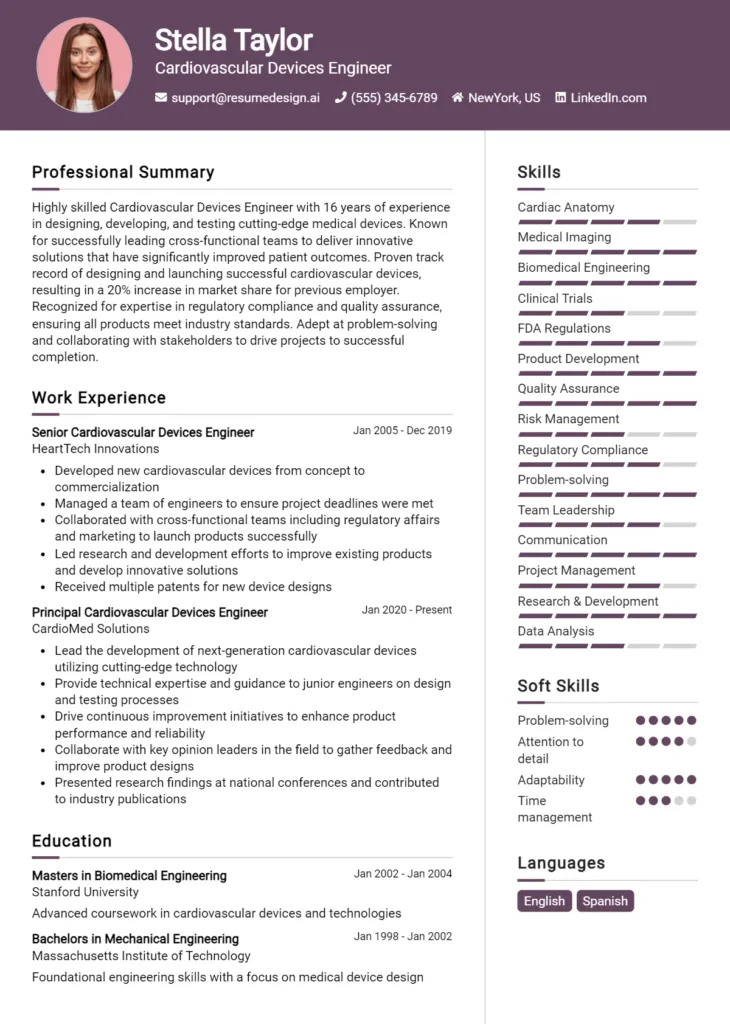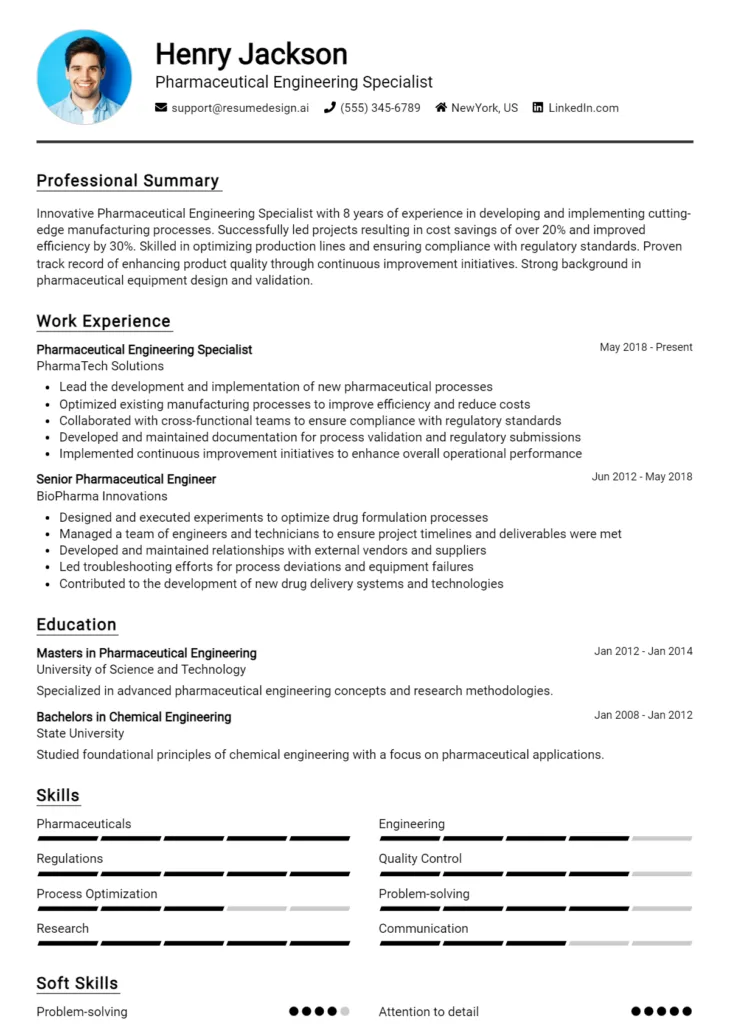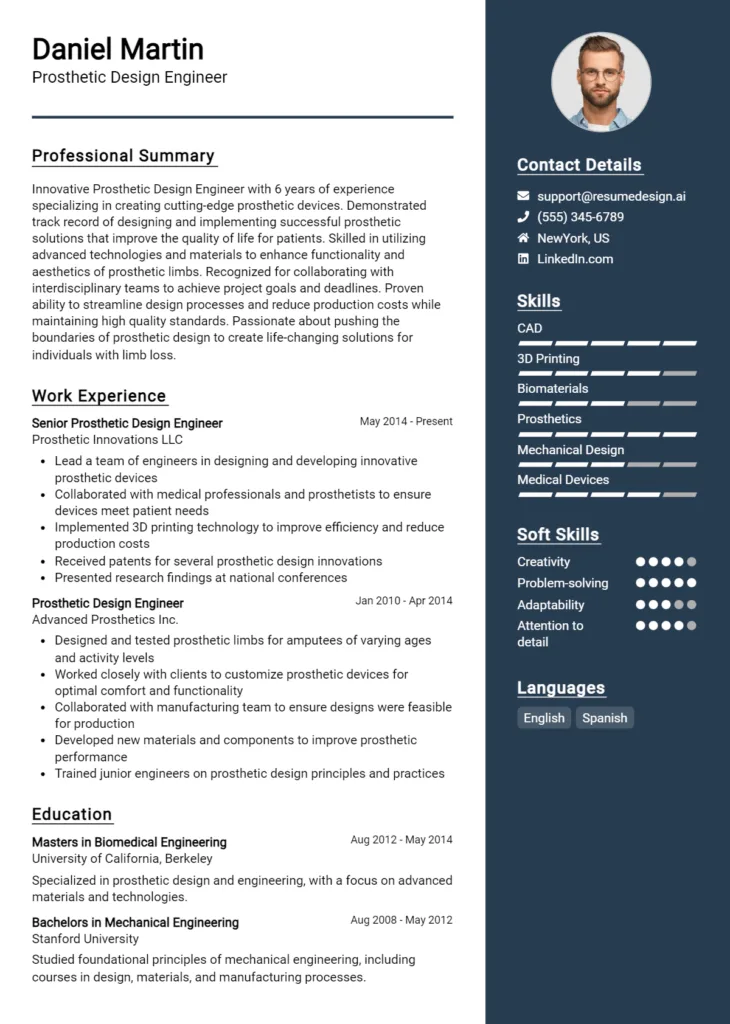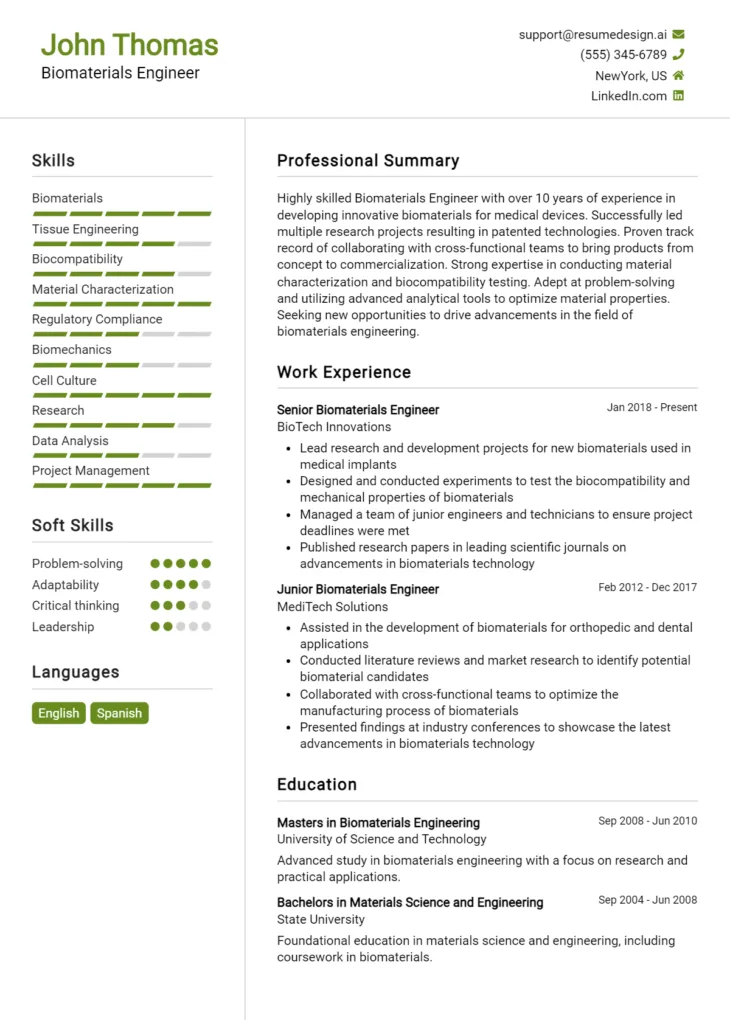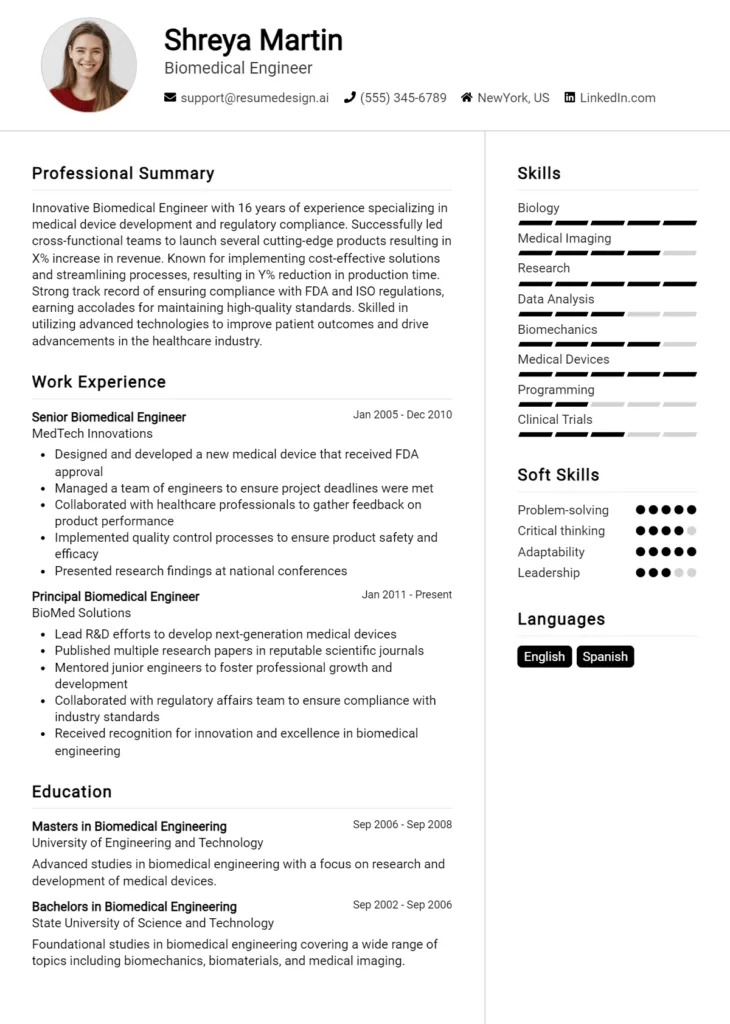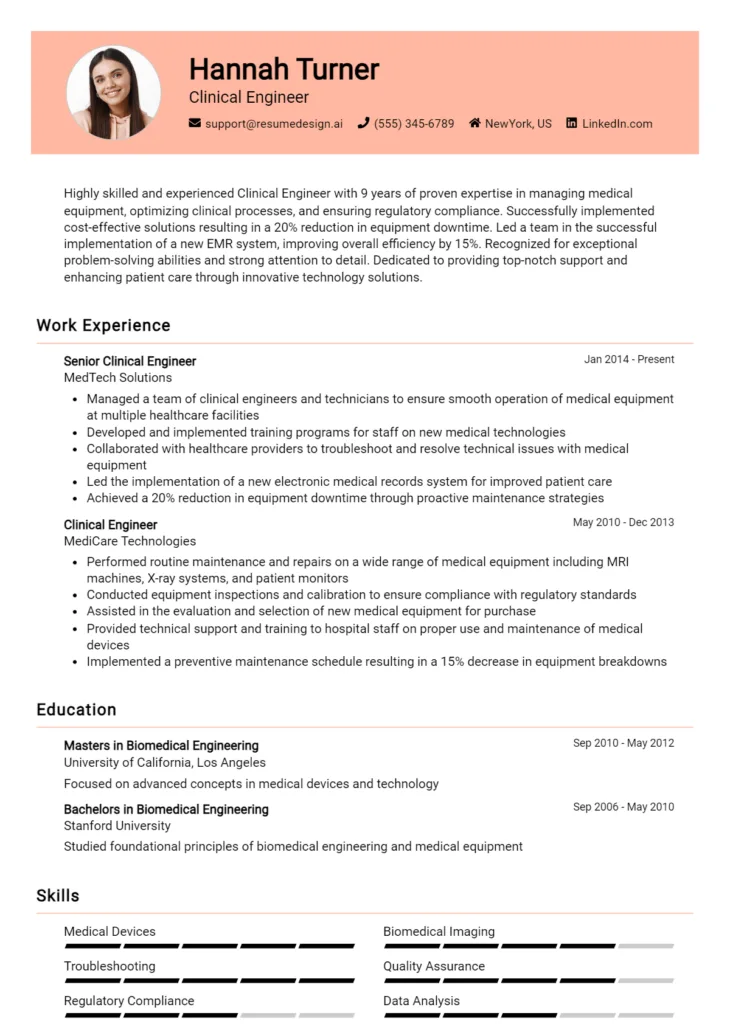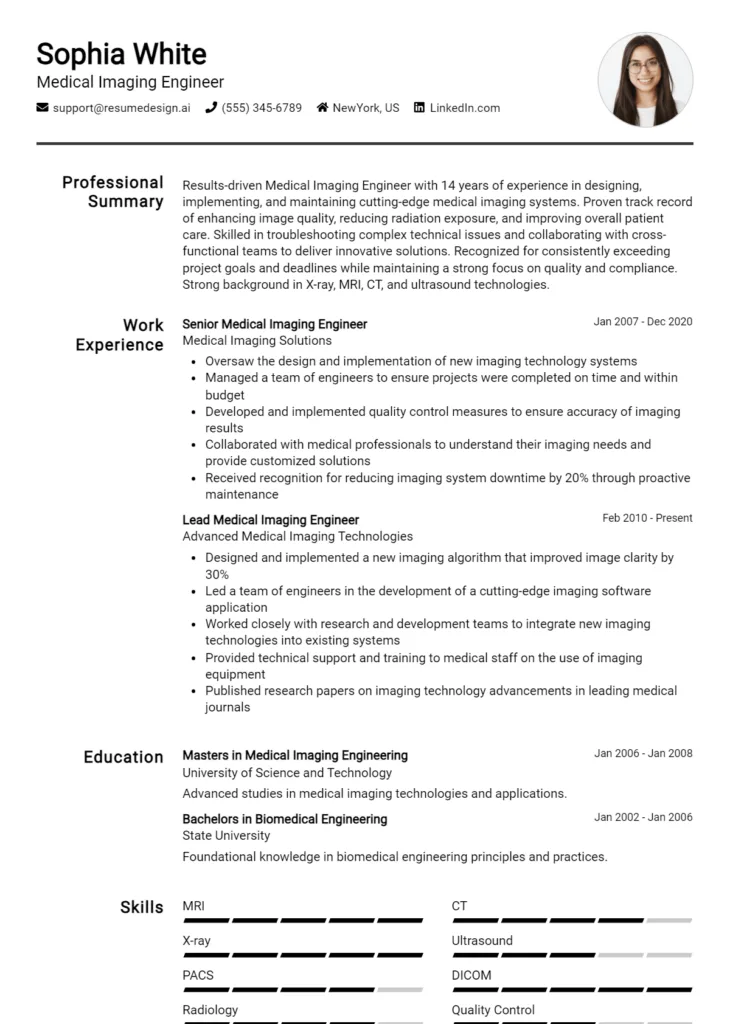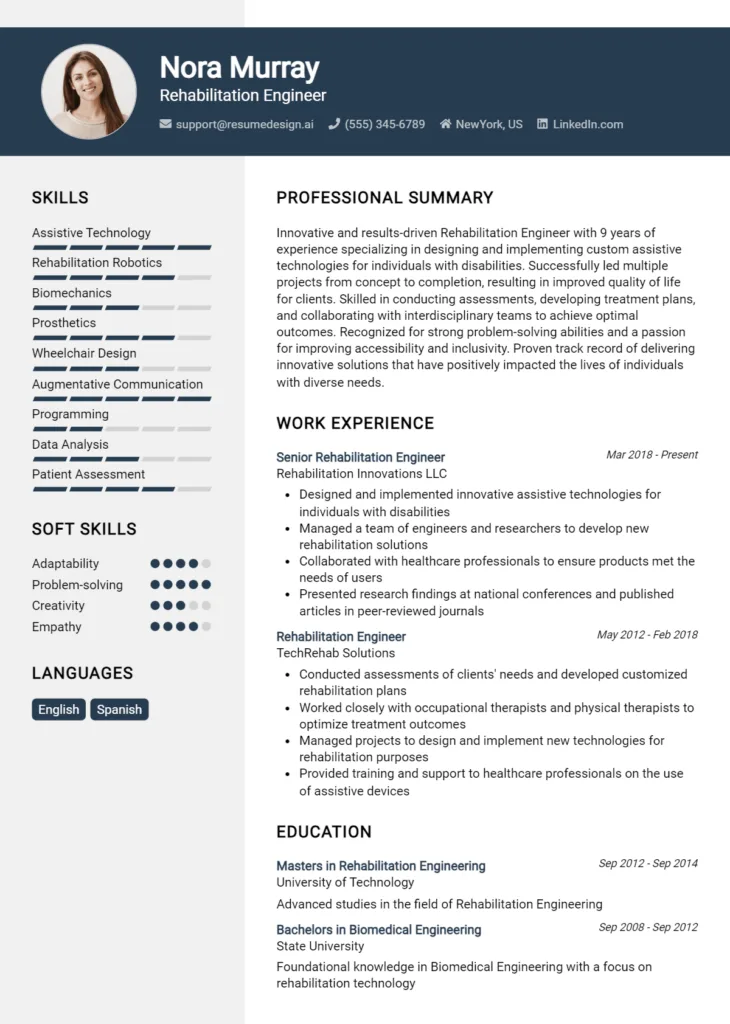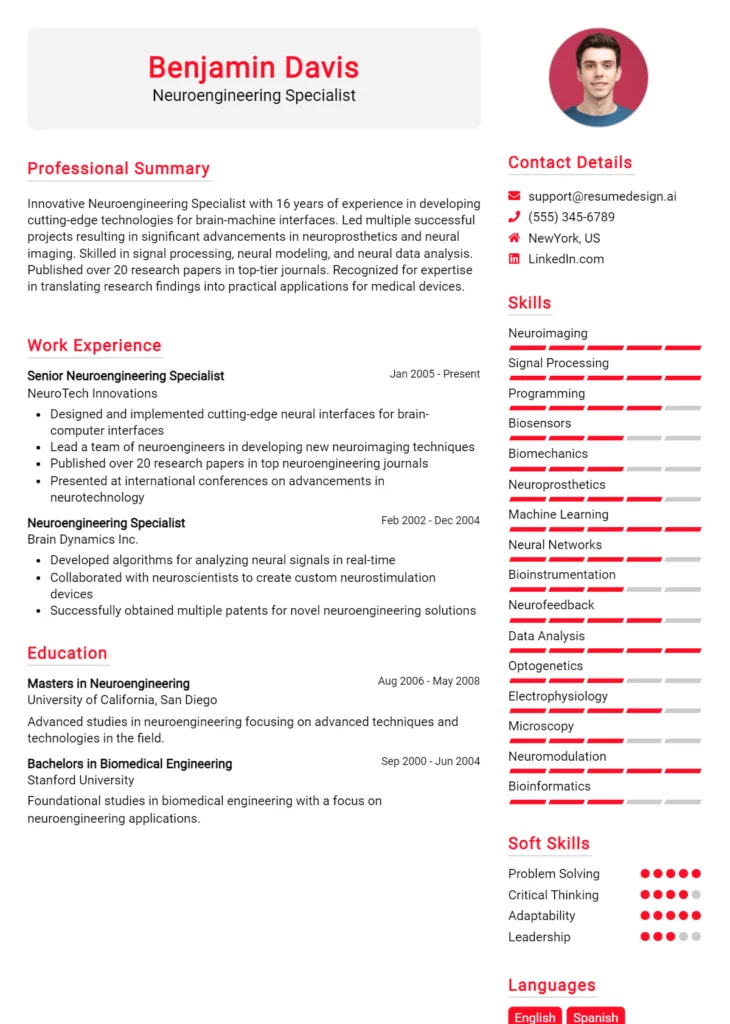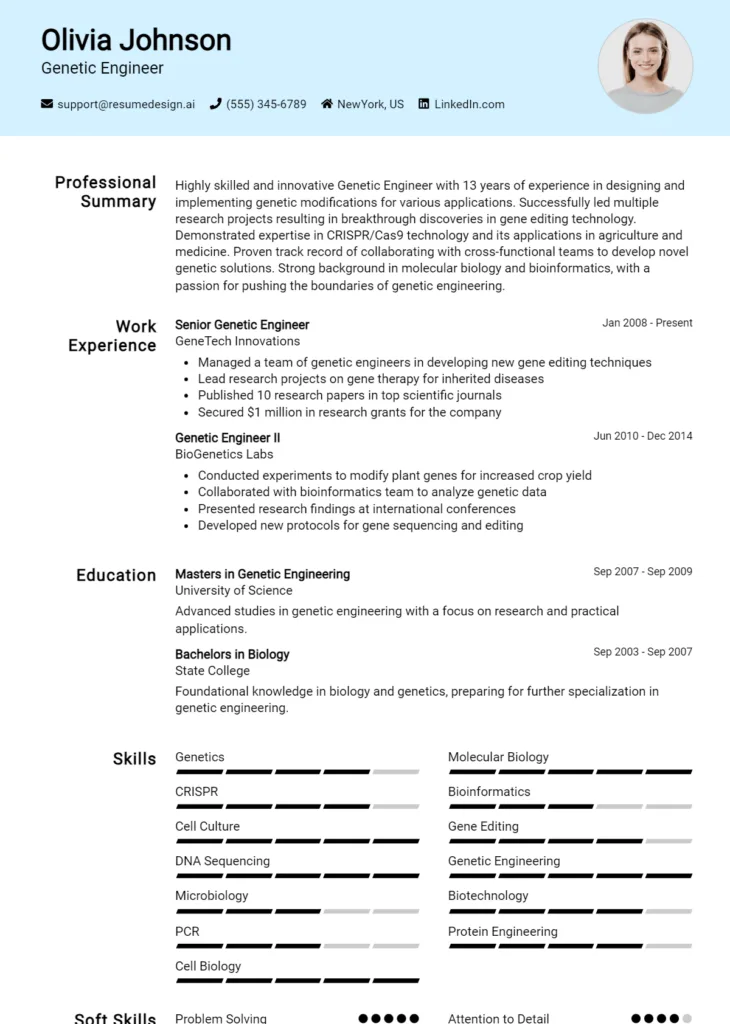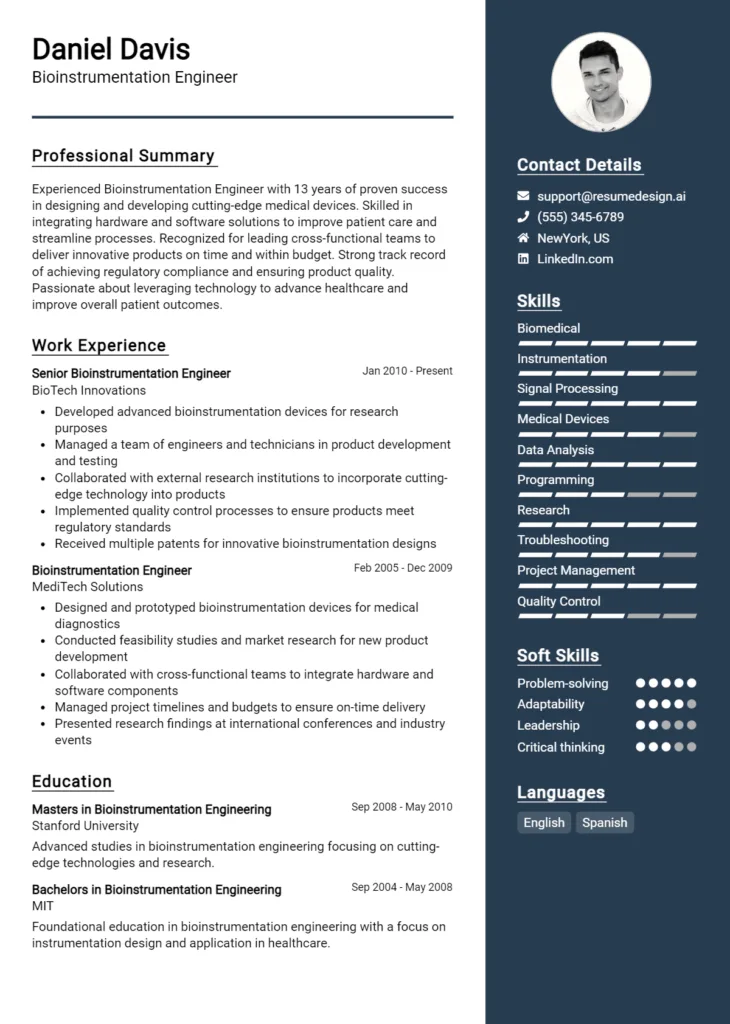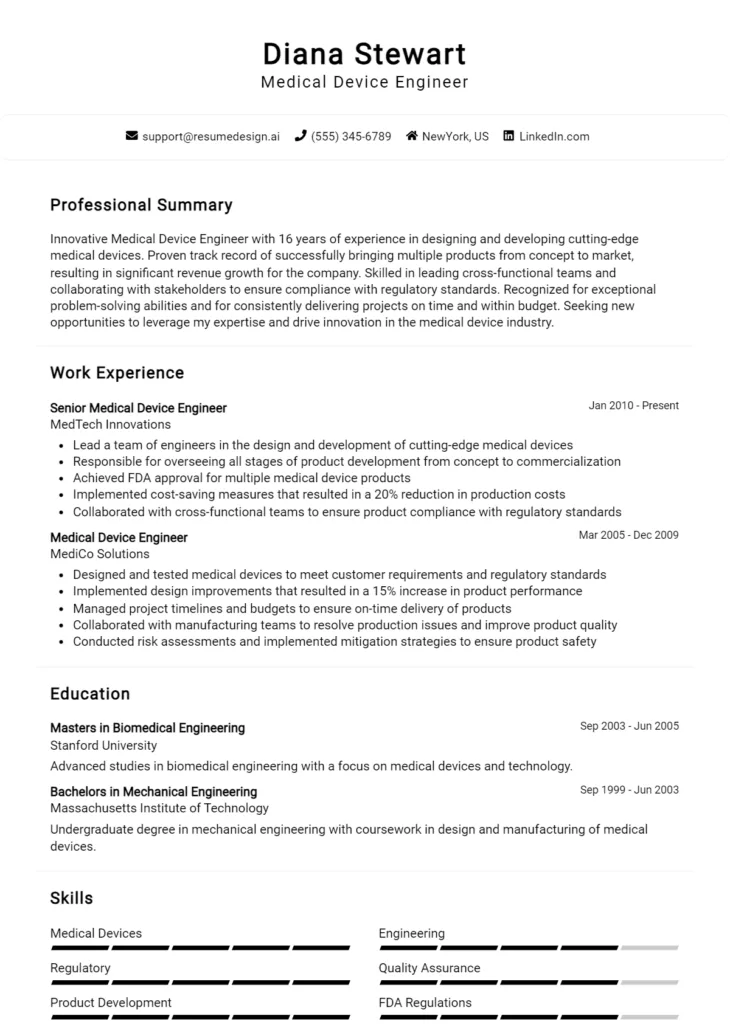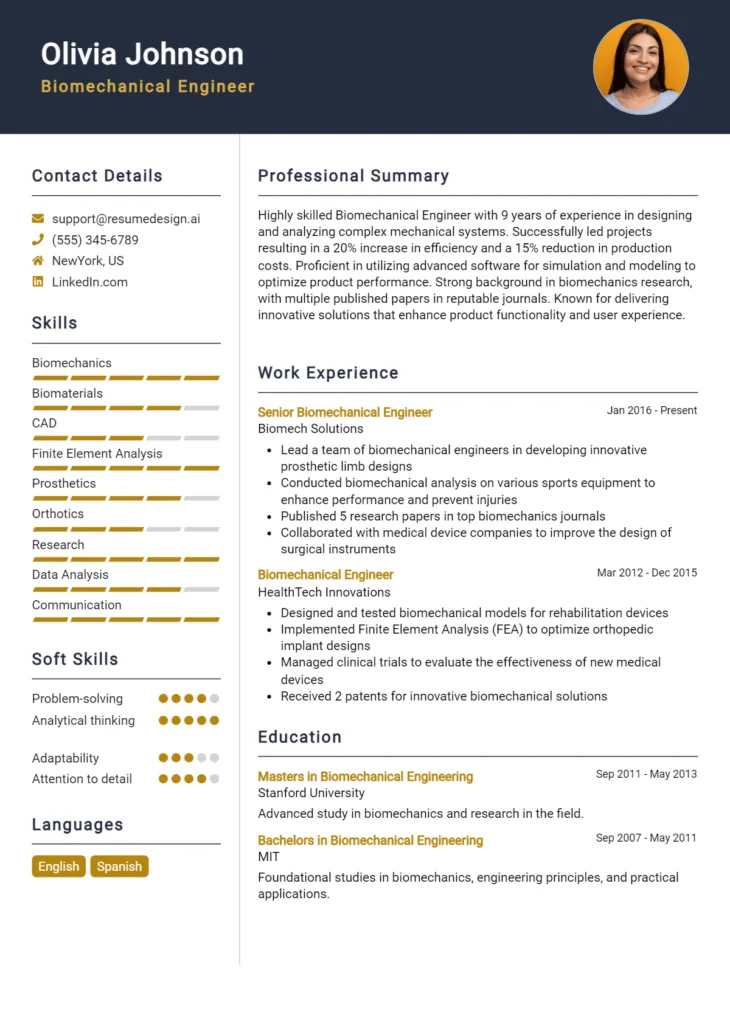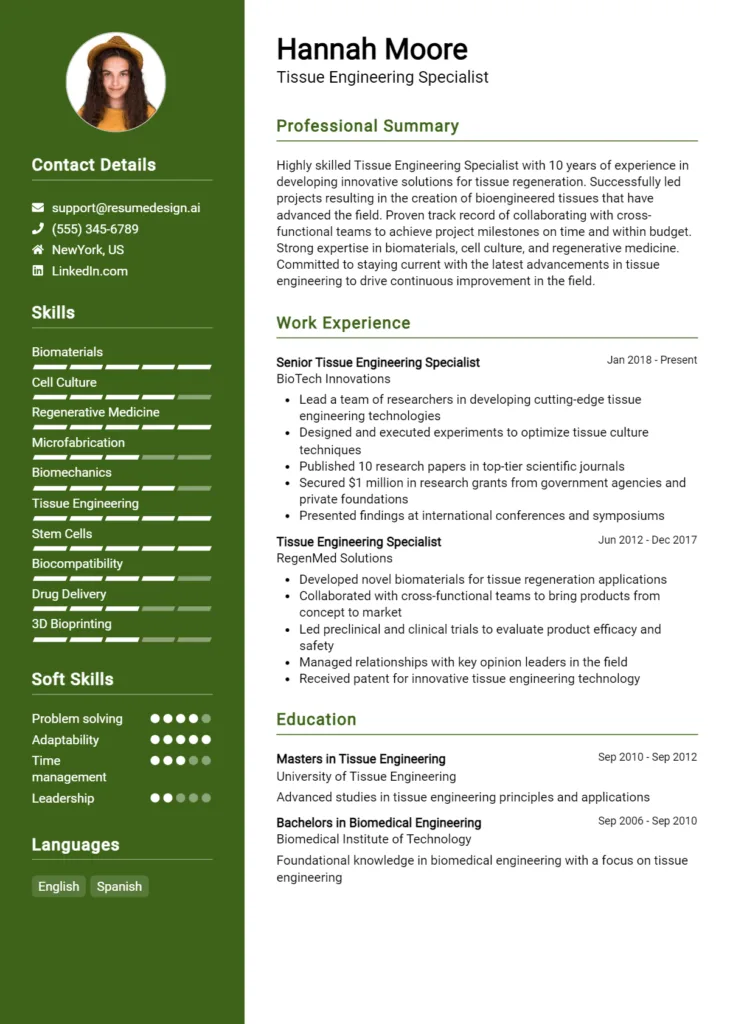Biomedical Equipment Technician Core Responsibilities
A Biomedical Equipment Technician (BMET) plays a vital role in healthcare by ensuring medical equipment operates safely and efficiently. Key responsibilities include troubleshooting, repairing, and maintaining medical devices, collaborating with clinicians and engineers to bridge operational gaps. Strong technical skills, attention to detail, and problem-solving abilities are essential for success. These competencies not only enhance patient care but also support organizational goals. A well-structured resume effectively showcases these qualifications, demonstrating the candidate's value to potential employers.
Common Responsibilities Listed on Biomedical Equipment Technician Resume
- Perform routine maintenance and safety inspections on medical equipment.
- Troubleshoot and repair malfunctioning devices in a timely manner.
- Calibrate and test medical equipment to ensure accuracy and compliance.
- Document maintenance activities and maintain service logs.
- Train healthcare staff on proper equipment usage and safety protocols.
- Assist in managing inventory and procurement of medical devices.
- Collaborate with clinical departments to assess equipment needs.
- Stay updated on industry standards and regulatory requirements.
- Participate in equipment installation and upgrades.
- Conduct risk assessments and develop preventive maintenance programs.
- Provide technical support and guidance to end-users.
- Maintain effective communication with vendors and service providers.
High-Level Resume Tips for Biomedical Equipment Technician Professionals
A well-crafted resume is essential for Biomedical Equipment Technician professionals, as it serves as the first impression a candidate makes on potential employers. In a field where technical expertise and precision are paramount, your resume must effectively reflect not only your skills but also your achievements in maintaining and repairing complex medical equipment. A strong resume can set you apart from the competition, showcasing your qualifications and demonstrating your value to potential employers. In this guide, we will provide practical and actionable resume tips specifically tailored for Biomedical Equipment Technician professionals to help you stand out in a competitive job market.
Top Resume Tips for Biomedical Equipment Technician Professionals
- Tailor your resume to the specific job description by including keywords and phrases that align with the position.
- Highlight relevant experience, focusing on roles and responsibilities that demonstrate your technical skills and knowledge of biomedical equipment.
- Quantify your achievements with specific metrics, such as the number of devices maintained or repaired, or improvements in equipment uptime.
- Showcase industry-specific skills, including familiarity with regulatory standards (e.g., ISO, FDA) and knowledge of safety protocols.
- Include certifications and training relevant to biomedical equipment, such as CBET (Certified Biomedical Equipment Technician) or other specialized credentials.
- Utilize a clean and professional layout to ensure your resume is easy to read and visually appealing.
- Incorporate keywords related to current technologies and tools used in the biomedical field to demonstrate your up-to-date knowledge.
- Summarize your professional profile at the beginning of your resume to quickly convey your expertise and career goals.
- Highlight any teamwork or collaboration experience, as many roles in this field require working closely with healthcare professionals.
- Proofread thoroughly to eliminate any errors, as attention to detail is critical in the biomedical equipment industry.
By implementing these tips, you can significantly increase your chances of landing a job in the Biomedical Equipment Technician field. A well-structured and tailored resume will not only highlight your qualifications but also demonstrate your commitment to excellence in a technical profession, making you an attractive candidate to potential employers.
Why Resume Headlines & Titles are Important for Biomedical Equipment Technician
In the competitive field of biomedical equipment technology, a well-crafted resume headline or title is crucial for capturing the attention of hiring managers. A strong headline serves as the first impression of a candidate's qualifications, summarizing their key skills and experience in a concise and impactful manner. It not only helps to differentiate a candidate from others but also sets the tone for the resume, making it clear that the applicant understands the specific requirements of the role. By being relevant and directly related to the job being applied for, an effective headline can significantly increase the chances of securing an interview.
Best Practices for Crafting Resume Headlines for Biomedical Equipment Technician
- Keep it concise: Limit the headline to a single impactful phrase.
- Be role-specific: Use terminology and keywords relevant to the biomedical equipment technician position.
- Highlight key qualifications: Focus on skills, certifications, or experiences that make you stand out.
- Use action words: Start with strong verbs to convey confidence and proactivity.
- Showcase achievements: If applicable, include quantifiable results or accomplishments.
- Tailor for each application: Customize the headline for each job to align with the specific requirements.
- Avoid jargon: Use clear language that is easily understood by hiring managers and recruiters.
- Make it compelling: Aim to evoke interest and curiosity about your qualifications.
Example Resume Headlines for Biomedical Equipment Technician
Strong Resume Headlines
"Certified Biomedical Equipment Technician with 5+ Years of Experience in Hospital Settings"
“Results-Driven Technician Specializing in Preventive Maintenance and Repair of Medical Devices”
“Detail-Oriented Biomedical Equipment Specialist Skilled in Troubleshooting and Technical Support”
Weak Resume Headlines
“Technician Seeking Job”
“Experienced Professional”
The strong headlines are effective because they are specific, mention relevant experience, and highlight key skills that are directly applicable to the role of a biomedical equipment technician. They immediately convey a sense of competence and readiness for the job. In contrast, the weak headlines fail to impress because they are vague and generic, lacking any detail that would inform the hiring manager about the candidate's qualifications or areas of expertise. This results in missed opportunities to stand out in a competitive job market.
Writing an Exceptional Biomedical Equipment Technician Resume Summary
Writing an exceptional resume summary is crucial for a Biomedical Equipment Technician, as it serves as the first impression for hiring managers. A strong summary quickly captures attention by succinctly showcasing key skills, relevant experience, and noteworthy accomplishments tailored to the specific job role. It acts as a compelling elevator pitch that highlights the candidate's qualifications, making it easier for employers to assess the applicant's fit for the position. A well-crafted resume summary should be concise, impactful, and reflective of the job description to effectively engage potential employers.
Best Practices for Writing a Biomedical Equipment Technician Resume Summary
- Quantify achievements: Use specific numbers or percentages to demonstrate the impact of your work.
- Focus on relevant skills: Highlight technical skills that are directly applicable to the role, such as equipment maintenance or troubleshooting.
- Tailor to the job description: Customize the summary to reflect the specific qualifications and responsibilities listed in the job posting.
- Use industry-specific terminology: Incorporate language that is familiar within the biomedical field to demonstrate expertise.
- Keep it concise: Aim for 3-5 sentences that capture your qualifications without overwhelming the reader.
- Highlight certifications and training: Mention any relevant certifications or specialized training that enhances your qualifications.
- Showcase soft skills: Include interpersonal skills such as communication and teamwork that are essential for collaborating with healthcare professionals.
- Emphasize problem-solving abilities: Illustrate your capability to resolve technical issues efficiently and effectively.
Example Biomedical Equipment Technician Resume Summaries
Strong Resume Summaries
Results-driven Biomedical Equipment Technician with over 5 years of experience in maintaining and repairing medical devices. Successfully increased equipment uptime by 30% through effective preventative maintenance schedules and timely troubleshooting.
Detail-oriented technician specializing in the calibration and servicing of surgical instruments. Achieved a 95% compliance rate in equipment safety inspections, ensuring adherence to regulatory standards and enhancing patient safety.
Certified Biomedical Equipment Technician with expertise in imaging systems and patient monitoring devices. Streamlined the repair process, reducing turnaround time by 40% while supporting a high-volume hospital environment.
Proactive Biomedical Equipment Technician with a strong background in electronic diagnostics. Led a project that upgraded hospital equipment, resulting in a 25% increase in operational efficiency and a significant reduction in repair costs.
Weak Resume Summaries
Experienced technician looking for a job in biomedical equipment. I have a background in fixing machines and working with medical devices.
I am a hard-working Biomedical Equipment Technician who wants to help hospitals and clinics with their equipment needs.
The strong resume summaries provide specific achievements, quantifiable results, and relevant skills that directly relate to the role of a Biomedical Equipment Technician, making them compelling and effective. In contrast, the weak resume summaries lack specificity, quantification, and detail, making them appear generic and uninspired. This comparison highlights the importance of crafting a targeted and impactful resume summary to stand out to potential employers.
Work Experience Section for Biomedical Equipment Technician Resume
The work experience section of a Biomedical Equipment Technician resume is crucial as it provides potential employers with insights into the candidate's practical technical skills, their ability to manage and collaborate with teams, and their commitment to delivering high-quality services and products. This section not only highlights relevant experiences but also allows candidates to quantify their achievements, demonstrating their impact in previous roles. Aligning this experience with industry standards and specific job requirements is essential for standing out in a competitive job market.
Best Practices for Biomedical Equipment Technician Work Experience
- Clearly define your technical skills relevant to biomedical equipment maintenance and repair.
- Use quantifiable metrics to showcase achievements, such as reduced downtime or improved equipment efficiency.
- Highlight leadership experiences, particularly in managing teams or training new technicians.
- Detail collaborative projects with cross-functional teams, emphasizing communication and teamwork.
- Tailor your experience to match the job description, focusing on the most relevant roles.
- Include certifications or specialized training that enhance your qualifications.
- Utilize action verbs to convey proactive involvement and initiative.
- Keep descriptions concise while ensuring clarity and relevance to the role.
Example Work Experiences for Biomedical Equipment Technician
Strong Experiences
- Led a team of 5 technicians to successfully complete over 200 preventive maintenance checks annually, resulting in a 30% reduction in equipment downtime.
- Implemented a new tracking system for equipment repairs that increased response time by 25%, enhancing service delivery to medical staff.
- Collaborated with clinical staff to identify and troubleshoot equipment malfunctions, improving patient safety ratings by 15% within one year.
- Conducted training sessions for junior technicians, improving team efficiency and reducing onboarding time by 40%.
Weak Experiences
- Responsible for fixing equipment when needed.
- Worked with other technicians on various tasks.
- Participated in some maintenance work.
- Assisted with equipment issues from time to time.
The examples listed as strong experiences are considered effective because they quantify achievements, demonstrate leadership and teamwork, and clearly articulate the candidate's contributions to improving processes and outcomes. In contrast, the weak experiences lack specificity, measurable results, and clear demonstration of skills or impact, making them less compelling to potential employers.
Education and Certifications Section for Biomedical Equipment Technician Resume
The education and certifications section of a Biomedical Equipment Technician resume is crucial for demonstrating the candidate’s academic background and specialized knowledge in the field. This section not only highlights the relevant degrees and coursework but also showcases industry-recognized certifications that reflect the technician’s commitment to continuous learning and professional development. By providing detailed information about educational achievements and certifications, candidates can significantly enhance their credibility and align themselves with the specific requirements of the job role, ultimately increasing their chances of securing interviews and job offers.
Best Practices for Biomedical Equipment Technician Education and Certifications
- Include only relevant degrees and certifications that pertain to biomedical equipment technology.
- Clearly state the name of the degree, institution, and graduation date to provide a complete picture.
- Highlight industry-recognized certifications such as Certified Biomedical Equipment Technician (CBET) or Certified Radiology Equipment Specialist (CRES).
- List any specialized training or workshops that demonstrate advanced skills or knowledge.
- Incorporate relevant coursework that aligns with job responsibilities to showcase specific competencies.
- Use clear and concise formatting to improve readability and highlight key achievements.
- Update the section regularly to reflect any new certifications or continuing education courses completed.
- Consider including any professional affiliations or memberships that enhance your qualifications.
Example Education and Certifications for Biomedical Equipment Technician
Strong Examples
- Associate Degree in Biomedical Equipment Technology from XYZ Community College, Graduated May 2022
- Certified Biomedical Equipment Technician (CBET) - Certification obtained April 2023
- Relevant Coursework: Medical Device Systems, Diagnostic Imaging Equipment, and Healthcare Technology Management
- Advanced Training in MRI and CT Imaging Equipment, Completed March 2023
Weak Examples
- Bachelor of Arts in History from ABC University, Graduated June 2020
- Certification in Basic First Aid - Expired 2021
- Coursework in General Psychology and Art History
- Online Course: Introduction to Cooking Techniques, Completed January 2022
The strong examples are considered effective because they directly relate to the skills and knowledge required for a Biomedical Equipment Technician, showcasing relevant education, certifications, and coursework that align with industry standards. Conversely, the weak examples illustrate qualifications that are either unrelated to the job role or outdated, failing to demonstrate the necessary competencies and commitment to professional development in the biomedical field.
Top Skills & Keywords for Biomedical Equipment Technician Resume
As a Biomedical Equipment Technician, possessing the right skills is crucial for ensuring that medical devices function safely and effectively. A well-crafted resume that highlights relevant skills not only showcases your expertise but also demonstrates your ability to contribute to patient care and safety in healthcare settings. Employers look for a combination of technical knowledge and interpersonal abilities, making it essential to include both hard and soft skills in your resume. By effectively communicating your skills, you can set yourself apart from other candidates and land the job you aspire to.
Top Hard & Soft Skills for Biomedical Equipment Technician
Soft Skills
- Attention to Detail
- Problem-Solving Abilities
- Strong Communication Skills
- Time Management
- Team Collaboration
- Adaptability
- Customer Service Orientation
- Critical Thinking
- Empathy
- Organizational Skills
Hard Skills
- Proficiency in Medical Device Calibration
- Knowledge of Electrical and Electronic Systems
- Familiarity with FDA Regulations and Standards
- Experience with Troubleshooting and Repairing Equipment
- Proficient in Computer Software for Equipment Management
- Understanding of Biomedical Instrumentation
- Ability to Read Technical Schematics
- Experience with Preventive Maintenance Procedures
- Knowledge of Safety Standards in Healthcare
- Familiarity with Networking and Connectivity of Medical Devices
By incorporating these skills into your resume, along with detailed work experience, you can present a comprehensive picture of your qualifications to potential employers.
Stand Out with a Winning Biomedical Equipment Technician Cover Letter
Dear [Hiring Manager's Name],
I am writing to express my interest in the Biomedical Equipment Technician position at [Company Name], as advertised on [Job Board/Company Website]. With a strong background in electronics and a deep understanding of medical equipment maintenance, I am excited about the opportunity to contribute to your team and support the critical healthcare services you provide. My hands-on experience, combined with my commitment to patient safety and equipment reliability, makes me an ideal candidate for this role.
In my previous position at [Previous Company Name], I successfully managed the repair and maintenance of a wide range of biomedical equipment, including imaging devices, ventilators, and patient monitoring systems. My proactive approach to preventive maintenance reduced equipment downtime by 20%, ensuring that all devices were functioning optimally and available for patient care. Additionally, I collaborated closely with clinical staff to educate them on proper equipment usage, which not only enhanced safety but also improved the overall efficiency of hospital operations.
I hold a degree in Biomedical Engineering Technology and am certified by [Relevant Certification Body]. My technical skills are complemented by my strong problem-solving abilities and attention to detail, which are crucial when diagnosing issues and implementing effective solutions. I am adept at utilizing diagnostic tools and software, and I thrive in fast-paced environments where I can apply my technical expertise to make a tangible difference in patient outcomes.
I am eager to bring my skills and experience to [Company Name] and support your mission of delivering exceptional healthcare. I look forward to the opportunity to discuss how my background aligns with the needs of your team. Thank you for considering my application. I hope to speak with you soon.
Sincerely,
[Your Name]
[Your Phone Number]
[Your Email Address]
Common Mistakes to Avoid in a Biomedical Equipment Technician Resume
When crafting a resume for a Biomedical Equipment Technician position, it's essential to present your qualifications and experience clearly and effectively. However, many candidates make common mistakes that can detract from their overall presentation and impact. Avoiding these pitfalls can significantly enhance your chances of standing out to hiring managers and securing an interview. Here are some common mistakes to steer clear of:
Lack of Specificity: Failing to include specific details about the types of biomedical equipment you have worked with can make your experience seem vague. Employers want to know exactly what you are familiar with.
Ignoring Technical Skills: Biomedical Equipment Technicians rely heavily on technical skills. Omitting relevant technical abilities like troubleshooting, maintenance, and repair can weaken your resume.
Using Generic Language: Many candidates use generic phrases and buzzwords that do not highlight their unique qualifications. Tailoring your language to reflect your personal experiences can make your resume more engaging.
Poor Formatting: A cluttered or unorganized resume can make it difficult for hiring managers to find essential information. Use clear headings, bullet points, and a clean layout to enhance readability.
Neglecting Certifications: Biomedical Equipment Technicians often require specific certifications. Failing to list your relevant certifications can make your resume less competitive.
Overlooking Soft Skills: While technical skills are crucial, soft skills like communication, teamwork, and problem-solving are equally important. Be sure to include these to present a well-rounded profile.
Not Tailoring the Resume: Sending the same resume for multiple job applications can be detrimental. Customize your resume for each position to reflect the skills and experiences most relevant to that specific job.
Including Irrelevant Experience: Listing jobs or experiences that do not relate to biomedical equipment can dilute your resume. Focus on relevant roles that demonstrate your qualifications for the position.
Conclusion
In conclusion, the role of a Biomedical Equipment Technician is crucial in ensuring that medical devices function safely and effectively. From maintaining and repairing complex machinery to adhering to regulatory standards, these professionals play a vital part in the healthcare system. As the demand for skilled technicians continues to grow, having a well-crafted resume is essential to stand out in the job market.
To enhance your chances of landing your dream job, it's time to review and refine your Biomedical Equipment Technician resume. Take advantage of the resources available to you, such as resume templates, which can help you format your information professionally. Consider using a resume builder for an interactive experience that guides you through creating an impactful resume tailored to your skills and experiences.
Additionally, explore resume examples to inspire your own document and ensure you highlight your qualifications effectively. Don't forget the importance of a compelling introduction; using cover letter templates can help you make a great first impression on potential employers.
Seize the opportunity to present yourself as the ideal candidate—revise your resume today and take a step closer to advancing your career as a Biomedical Equipment Technician!


